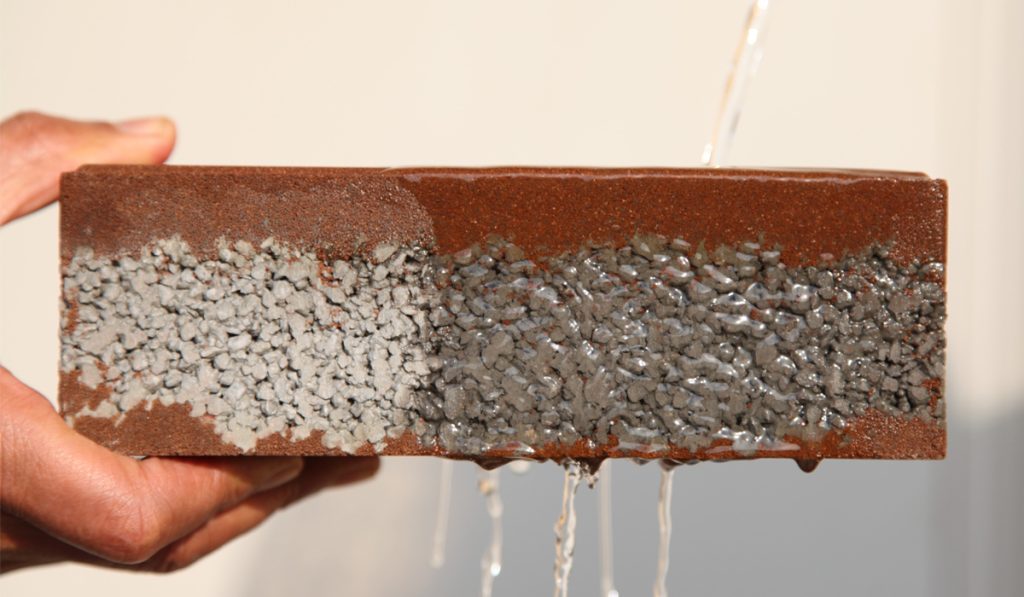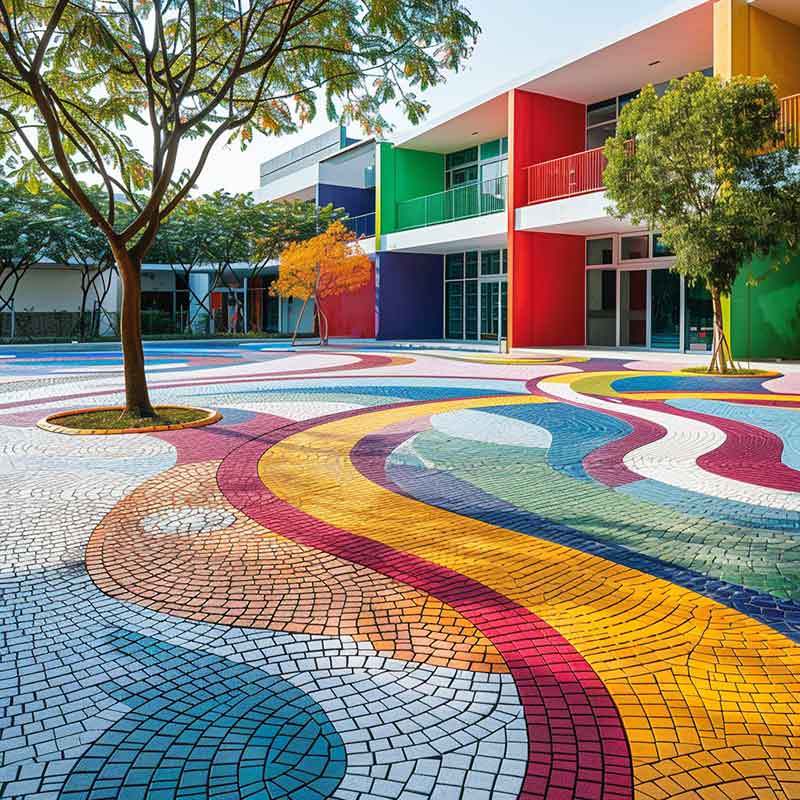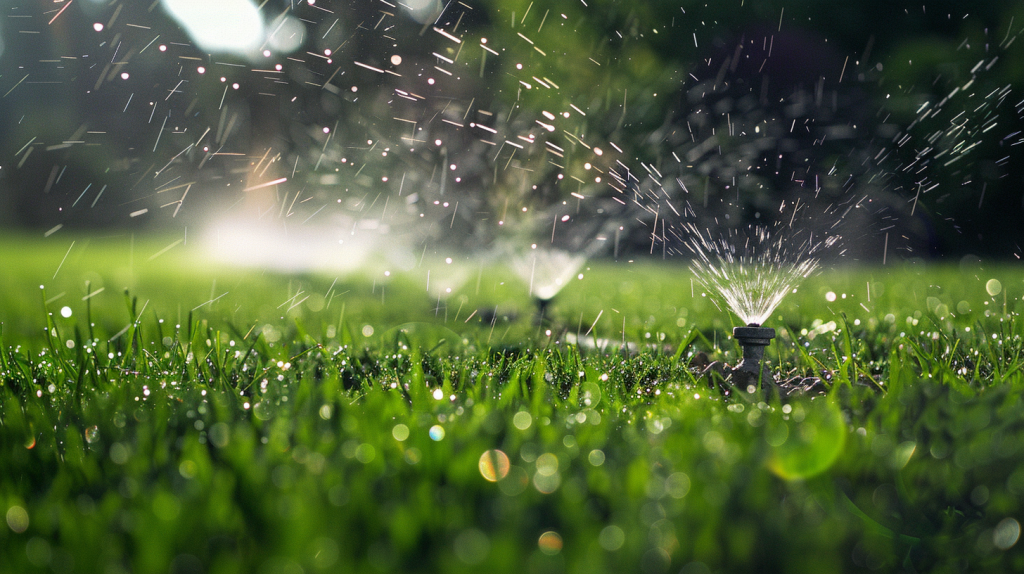Permeable Bricks | Permeable Concrete | Permeable Concrete Pavers An Important Part of Sustainable Urban Development
Permeable bricks, also known as permeable concrete or Permeable Concrete Pavers, are a type of construction material designed to allow water to pass through them, facilitating the natural infiltration of rainwater into the ground. This material is used in the construction of surfaces that need to manage stormwater efficiently and reduce runoff, contributing to sustainable urban development.
Yude Rain Eco | High Quality Permeable bricks & permeable concrete & Permeable Concrete Pavers | Permeable bricks Supplier & Manufacturer | Ground Drainage Solutions

Foundation Features
- High permeability: Yude RainEco’s permeable bricks and permeable concrete have a highly porous structure that promotes surface rainwater infiltration and groundwater recharge.
- Environmentally friendly materials: Produced using environmentally friendly raw materials, they reduce the burden on the environment and promote a green transition in construction projects.
- Durable: Good resistance to abrasion and compressive strength ensures a long service life and reduces maintenance costs.
- Easy to maintain: Permeable bricks and concrete are designed to simplify cleaning and maintenance and maintain long-term permeability.
- Aesthetically pleasing: Offering a wide variety of colors and designs, they can meet different aesthetic needs and enhance the visual appeal of cityscapes and buildings.
The value that Yude RainEco’s permeable tiles and pervious concrete bring to customers
- Improve stormwater management: Effectively control and manage surface runoff, reducing the risk of urban flooding and improving the efficiency of urban drainage systems.
- Promotes environmental sustainability: Helps protect and improve the urban water environment by reducing stormwater runoff and increasing groundwater recharge.
- Reduce construction and operating costs: Long-term durability and low maintenance costs provide cost-effective solutions for urban infrastructure projects.
- Enhance public comfort and health: Reduces waterlogging and provides a safer and more comfortable walking environment, while mitigating the heat island effect and improving the urban climate.
Services provided by Yude Rain Eco
- Customized solutions: Provide customized permeable brick and concrete solutions according to the specific needs of the project to ensure the best performance and results.
- Technical support and consulting: Provide professional technical support and consulting services to help customers choose the right products and solve problems encountered during installation and use.
- Installation guidance and training: Provide professional installation guidance and training to ensure the correct laying and use of permeable bricks and concrete to achieve the best permeable effect.
Composition and Structure
Permeable bricks are made from a mixture of cement, coarse aggregate, and water, with little to no fine aggregate (sand), which results in a porous structure. This structure allows water to flow through the brick or concrete, unlike traditional concrete that is impermeable.
Key Characteristics
- High Porosity: The porous nature of permeable bricks enables water to percolate through the surface and absorb into the soil below, reducing surface runoff and promoting groundwater recharge.
- Reduced Stormwater Runoff: By allowing rainwater to infiltrate the ground, permeable paving can mitigate the effects of stormwater runoff, which can reduce the risk of flooding and erosion in urban areas.
- Temperature Control: Permeable surfaces can help in reducing the urban heat island effect, as the water retained in the pores of the bricks can cool the surface through evaporation.
- Environmental Benefits: The use of permeable bricks contributes to improved water quality, as the process of infiltration through the material can help filter out pollutants from the water.
Permeable Concrete Pavers Advantages
Sustainable Urban Development
- Green Infrastructure: These materials are integral to green infrastructure projects, creating permeable surfaces that reduce runoff, increase water infiltration, and support groundwater recharge, contributing to the sustainability of urban environments.
- Eco-friendly Pavements: Used for sidewalks, plazas, and other pedestrian areas, permeable paving materials align with eco-friendly urban design principles by reducing impervious surface areas and managing rainwater naturally.
- Heat Island Mitigation: By allowing water to permeate through the surface and cool the surrounding areas through evaporation, these materials help mitigate the urban heat island effect, leading to cooler urban environments.
- Landscaping and Aesthetic Enhancements: Permeable materials can be aesthetically designed to enhance the visual appeal of urban and residential landscapes while providing environmental benefits.
Urban Drainage - Stormwater Management: In urban drainage systems, permeable surfaces act as a natural filter, reducing stormwater runoff, controlling flooding, and filtering pollutants before they infiltrate into the soil or reach the waterways.
- Roadways and Parking Areas: Utilizing permeable materials in parking lots and access roads reduces surface runoff and the need for extensive stormwater drainage infrastructure, promoting more efficient land use and reducing construction costs.
- Residential Developments: In housing developments, these materials can be used for driveways, patios, and walkways to manage rainwater at the source, decreasing the impact on municipal drainage systems and reducing the likelihood of property flooding.
- Sports and Recreational Fields: For sports facilities, using permeable paving provides effective drainage, maintaining usability of the areas during wet conditions and reducing maintenance needs.
Integration with Water-sensitive Urban Design (WSUD)
- WSUD Strategies: Permeable paving is a key component of WSUD, an approach that integrates the urban water cycle into urban planning and design. It helps manage stormwater as a resource rather than a waste product, promoting healthier urban waterways and landscapes.
- Bioretention Systems: These materials are often used in conjunction with bioretention cells or rain gardens, where they enhance the infiltration and treatment of stormwater while supporting vegetation that can further filter and manage water flow.
Climate Change Adaptation
- Resilience Building: With the increased frequency of extreme weather events due to climate change, permeable surfaces provide a resilient solution for managing excessive rainfall and reducing flood risks in urban areas.
- Adaptive Infrastructure: They allow cities to adapt to changing climate conditions by improving the capacity of urban areas to manage larger volumes of stormwater, reducing the strain on existing sewer systems and mitigating the effects of extreme rainfall events.
Why Choose Yude Rain Eco's Permeable Concrete Pavers Solution?
- Advanced Technology and High Quality
Yude Rain Eco employs advanced manufacturing processes to produce Permeable Concrete Pavers and concrete that meet high-quality standards. Their products are designed to offer superior durability, strength, and permeability, ensuring long-term performance and reliability. - Enhanced Environmental Sustainability
Yude Rain Eco’s permeable solutions are environmentally friendly, made from sustainable materials that minimize the impact on the ecosystem. They contribute to groundwater recharge, reduce stormwater runoff, and improve the quality of local water bodies by filtering pollutants. - Customized Solutions
Understanding that each project has unique requirements, Yude Rain Eco offers customizable solutions. Their permeable products can be tailored in terms of size, shape, color, and texture to fit the specific design and functional needs of urban spaces. - Comprehensive Water Management
These permeable solutions are integral to effective water management strategies, especially in urban areas where conventional impervious surfaces contribute to waterlogging and flooding. Yude Rain Eco’s products facilitate the natural flow of water, reducing the burden on drainage systems and mitigating flood risks. - Urban Heat Island Mitigation
By facilitating water infiltration and retention, Yude Rain Eco’s solutions help cool urban surfaces and reduce the urban heat island effect, contributing to more comfortable and healthier urban environments. - Aesthetic and Functional Flexibility
Yude Rain Eco’s permeable products are not only functional but also aesthetically pleasing, offering a range of designs and finishes that enhance the visual appeal of public and private spaces while providing the necessary environmental benefits. - Cost-Effective and Low Maintenance
The durability and efficiency of Yude Rain Eco’s permeable materials lead to lower maintenance and replacement costs, offering a cost-effective solution over the long term. Their ease of installation and minimal upkeep requirements further reduce the overall cost of infrastructure development. - Expertise and Support
Yude Rain Eco provides comprehensive support, including technical advice, installation guidance, and after-sales service, ensuring that their permeable paving solutions are implemented effectively and continue to perform optimally over time. - Commitment to Research and Innovation
Yude Rain Eco is dedicated to ongoing research and development in the field of sustainable building materials, continuously improving their products to meet the evolving needs of urban development and environmental conservation.
Areas of Application
Permeable bricks, permeable concrete, and Permeable Concrete Pavers are innovative materials used in construction to promote sustainable water management by allowing water to pass through their surface into the ground below.
- Urban Paving
Sidewalks and Walkways: These materials are ideal for pedestrian paths, reducing runoff and enhancing comfort by mitigating the heat island effect.
Driveways and Residential Roads: Permeable surfaces in residential areas can significantly reduce the amount of runoff from properties, decreasing the load on stormwater systems. - Parking Lots
Permeable paving in parking areas can absorb rainwater, reducing the need for extensive drainage systems and mitigating the risk of flooding. - Landscaping
Gardens and Parks: Utilized in green spaces to allow water to reach plant roots and replenish underground aquifers, promoting healthy vegetation and biodiversity.
Tree Surrounds: Pervious materials around trees in urban areas can provide essential water and air to tree roots, supporting urban forestry efforts. - Recreational Areas
Sports courts, playgrounds, and other recreational surfaces made with permeable materials can improve safety by reducing surface water, thus lowering the risk of slip-related accidents. - Road Infrastructure
Low-Traffic Roads and Bike Paths: These surfaces are suitable for areas with less vehicular stress but require effective water drainage to prevent puddles and erosion. - Stormwater Management Features
Permeable surfaces are integral to stormwater management systems designed to control runoff and prevent pollutants from entering waterways, aiding in water quality improvement. - Commercial Developments
Business complexes and retail centers can incorporate permeable paving to manage runoff effectively, reduce the need for stormwater management infrastructure, and contribute to sustainable building certifications. - Industrial Sites
Areas within industrial estates can use permeable materials to reduce the impact of large impervious surfaces, helping to manage stormwater runoff and pollutant filtration. - Water Sensitive Urban Design (WSUD)
Permeable surfaces are key components in WSUD, an approach that integrates the urban water cycle, including stormwater, groundwater, and wastewater management, into the urban design process.


